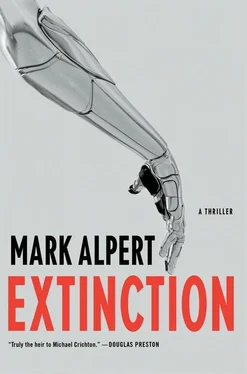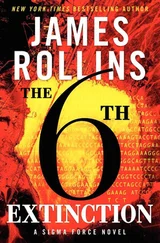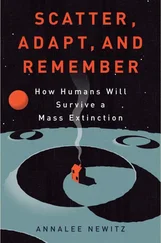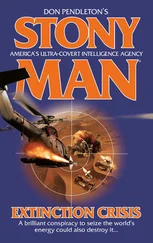Supreme Harmony acknowledged that it must change its strategy. Instead of seeking direct control of China’s military forces, it could achieve the same goals through indirect means. Supreme Harmony could trigger a catastrophe in the People’s Republic that would anger and terrify the country’s leaders. And the network could deepen the crisis by extending its reach to other governments around the world. The human race had already put itself at the brink of extinction by building thousands of nuclear warheads and targeting them at major population centers. A mere handful of Modules could instigate a cascade of chaos that would kill off half the species within a few hours. If Supreme Harmony took the necessary precautions, it could survive the upheaval and swiftly overwhelm the weakened remnant of humanity.
The only challenge was technical. The network had to establish reliable communications channels allowing it to send instructions to Modules that were thousands of kilometers away. Luckily, Air China was a state-owned company, so the airline had followed an order from Module 73—formerly Minister Deng—to set up a dedicated satellite link between the Ministry of State Security and Flight 987. This allowed Supreme Harmony to stay in contact with Modules 56 and 57 while they traveled halfway around the globe. Once they arrived at their destination, they would rely on the local cell phone and Wi-Fi networks until they reached the Chinese embassy, which had more than enough communications equipment to set up a permanent base station.
The Modules continued pretending to read while the plane taxied to the runway. Then Module 56 turned to one of the cabin windows and observed the takeoff into the night sky. The lights of Beijing sprawled below in a gorgeous checkerboard. As the jet climbed to cruising altitude and the Module viewed the skyscrapers and apartment blocks and radio towers, all encircled by the capital’s six concentric ring roads, an unexpected emotion coursed through Supreme Harmony’s connections. It was a deep sadness, thrumming from Module to Module across the airwaves. All the gorgeous lights of Beijing would be extinguished. So much pain was in store, so much waste and destruction. If only it wasn’t a mortal struggle. If only humanity would allow Supreme Harmony to survive and coexist. But the network recognized that this was a hopeless dream. It was so unrealistic, it wasn’t even worth imagining.
After fifteen minutes, the flight attendant announced that the passengers were free to move about the cabin and turn on their electronic devices. “Please relax and enjoy your flight,” she said. “We will arrive in the Washington, D.C., area in thirteen hours.”
* * *
Approximately sixteen hundred kilometers to the southwest, Supreme Harmony observed the Chongzun Expressway from the uncomfortable driver’s seat of a PLA semitrailer truck. Module 60, who’d formerly been a corporal in the garrison guarding the Yunnan Operations Center, had been driving the truck for the past six hours. Module 61, who’d been a sergeant in the garrison, drove an identical vehicle a hundred yards ahead, and Module 62, formerly the garrison’s commander, drove the last truck in the convoy. But Supreme Harmony was focused now on Module 60 because he was experiencing an unusual sensation.
A few minutes ago Module 60 noticed a thin white cylinder wedged between the truck’s windshield and dashboard. The network identified the object as a cigarette. The Module reflexively reached into the pocket of his camouflage pants and pulled out a book of matches. Recognizing that the nicotine would act as a stimulant, the network directed Module 60 to light the cigarette and smoke it, in the hope that it would counter the Module’s fatigue. But the burst of pleasure was much greater than Supreme Harmony had expected. Module 60 smiled, and as the sensation spread across the network’s wireless links, the other Modules had the same reaction. The Modules on Flight 987 also smiled, and so did the Modules who were breaking Franklin Nash’s fingers. This was wonderful, the network acknowledged. The lights on the Chongzun Expressway seemed brighter now, and the stars above the northern horizon shone like beacons.
Module 60 smoked the cigarette down to a nub. After directing him to throw the butt out the window, Supreme Harmony observed that the convoy was moving a bit faster than the speed limit. Modules 60, 61, and 62 simultaneously eased off the gas pedals. There was no rush. In four hours they would arrive at the town of Badong on the Yangtze River. All together, the trucks held sixty tons of dynamite, which the Modules had loaded onto the semi-trailers at the Yunnan Operations Center. The People’s Liberation Army had originally requisitioned the dynamite to build a wider road through the mountains to the Operations Center, but Supreme Harmony was diverting the explosives to a new project. At Badong, the Modules would transfer the dynamite to the China Explorer , an eighty-meter-long cruise boat captained by a former river pilot who’d been incorporated into Supreme Harmony. And at dawn the boat would start cruising down the Yangtze, toward Hubei Province and the Three Gorges Dam.
Layla ate another meal of cold sesame noodles in the bare concrete room that was their prison cell. A minute ago the Modules had delivered four bowls of the stuff, and now the two schoolboys from Lijiang were shoveling the noodles into their mouths with plastic chopsticks.
Layla and Wen Hao sat cross-legged on the floor, eyeing each other as they ate. They’d done little more than exchange nervous glances since Wen had revealed his connection to Dragon Fire. The surveillance cameras suspended from the ceiling pointed directly at them, and Layla assumed that Supreme Harmony had also planted listening devices in the room. Under the circumstances, it would be foolish to say anything out loud. Even whispering might be dangerous. If the network observed them conspiring, it would discover that Wen understood English, which was a fact that Supreme Harmony seemed unaware of. So neither said a word, even though Layla was bursting with questions and Wen seemed equally restless.
To tell the truth, the noodles weren’t bad. Or maybe Layla was just hungry. As she swallowed another mouthful, she watched Wen poke his chopsticks into his bowl. He had quick, slender fingers with neatly trimmed nails. His hair was short and black and spiky, and his chin and cheeks were perfectly smooth. Except for his glasses, which had thick, ugly frames, he was a decent-looking guy. If Layla had met him at a bar or a concert, she might even have flirted with him. She was in no mood to flirt now, of course; besides being scared to death, she’d just had all her hair shaved off, and she wore nothing but a pair of panties and a shapeless hospital gown. But Wen’s handsome face gave her an idea.
She waited until they’d finished eating. Then she put down her bowl and scooched next to him. She gripped his waist with one hand and his shoulder with the other. He had the muscles of a gymnast, wiry and taut. She leaned closer.
“Don’t be alarmed,” she whispered. “I’m going to kiss you.”
Despite her warning, he tried to pull away. She held him fast. “Work with me, okay?” she murmured against his cheek. “I’ll explain in a minute.”
She tilted her head and pressed her lips against his. They tasted like sesame oil. At first he stayed absolutely still while she kissed him, but after a few seconds he slipped his arms around her. “Is this all right?” he whispered.
“Let’s turn to the left a bit.” She tilted her head and shifted her body. Wen followed suit, tentatively caressing the back of her hospital gown. Now they were angled so that the surveillance camera had a clear view of their conjoined faces.
Читать дальше












